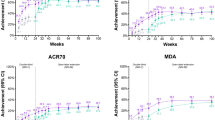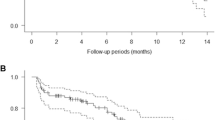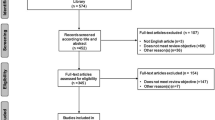Abstract
Goals of work
The objective of this study was to determine the effect of infliximab, an antitumor necrosis factor alpha (TNFα) antibody, on fatigue in patients with advanced cancer.
Materials and methods
This was a pilot study undertaken in a specialist palliative care unit. Seventeen eligible outpatients were enrolled in this study. Infliximab 5 mg/kg was administered intravenously at baseline and if there was observable clinical benefit, every 4 weeks thereafter until clinical benefit was lost. The primary outcome measure assessing subjective functional improvement was the change in fatigue severity scale (FSS) score at 4 weeks following an infliximab infusion. Secondary outcome measures of subjective functional improvement that were assessed 4 weeks after each infliximab infusion included changes in Karnofsky performance status (KPS), hospital anxiety and depression scale (HADS) score, anxiety and depression subscores, and appetite visual analogue scale. Clinical laboratory assessments were C-reactive protein (CRP), erythrocyte sedimentation rate (ESR), TNFα, interleukin-6, and leptin concentrations.
Main results
At week 4, 9 of 14 patients improved in FSS, 3 of 15 improved in KPS, 7 of 15 improved in total HADS and the majority had modest improvements in serum CRP, ESR, or leptin concentrations. Case studies of six patients with overall improvement are described in detail. Five serious adverse events occurred; two were serious infections possibly related to treatment.
Conclusions
A subgroup of patients in this small pilot study demonstrated uniform subjective/clinical benefit. We were not able to identify any predictors of this response; a larger, controlled study may reveal more information.






Similar content being viewed by others
References
Aaronson NK, Ahmedzai S, Bergman B et al (1993) The European organisation for research and treatment of cancer QLQ-C30: a quality of life instrument for use in international clinical trials in oncology. J Natl Cancer Inst 85:365–376
Antunovic P, Marisavljevic D, Kraguljac N, Jelusic V (1998) Severe hypercalcaemia and extensive osteolytic lesions in an adult patient with T cell acute lymphoblastic leukaemia. Med Oncol 15:58–60
Argilés JM, López-Soriano FJ (1999) The role of cytokines in cancer cachexia. Med Res Rev 19:223–248
Beutler B, Cerami A (1988) Tumour necrosis, cachexia, shock and inflammation: a common mediator. Annu Rev Biochem 57:505–518
Breaden K (1997) Cancer and beyond: the question of survivorship. J Adv Nurs 26:978–984
Coleman MP, Babb P, Damiecki P, Grosclaude P et al (1999) Cancer survival trends in England and Wales, 1971–1995: deprivation and NHS Region. Studies in Medical and Population Subjects No 61. The Stationery Office, London
Colombel JF, Loftus EV Jr, Tremaine WJ et al (2004) The safety profile of infliximab in patients with Crohn’s disease: the Mayo clinic experience in 500 patients. Gastroenterology 126:19–31
Couriel DR, Hicks K, Giralt S, Champlin RE (2000) Role of tumour necrosis factor-alpha inhibition with infliximab in cancer therapy and haematopoetic stem cell transplantation. Curr Opin Oncol 12:582–587
Finck BN, Johnson RW (2000) Tumour necrosis factor-alpha regulates secretion of the adipocyte-derived cytokine, leptin. Microsc Res Tech 50:209–215
Hanauer SB (1999) Review article: safety of infliximab in clinical trials. Aliment Pharmacol Ther Suppl 4:16–22 discussion 38
Karnofsky DA, Burchenal JH (1949) The clinical evaluation of chemotherapeutic agents in cancer. In: MacLeod CM (ed) Evaluation of chemotherapeutic agents. Columbia University Press, New York, pp 199–205
Krupp LB, LaRocca NG, Muir-Naxh J et al (1989) The fatigue severity scale. Application to patients with multiple sclerosis and systemic lupus erythematosus. Arch Neurol 46:1121–1123
Kurzrock R (2001) The role of cytokines in cancer-related fatigue. Cancer 92(6 Suppl):1684–1688
Remicade (Infliximab) (2005) Physicians desk reference. Medical Economics Company, Montvale, USA
Schaible TF (2000) Long term safety of infliximab. Can J Gastroenterol 14:29C–32C
Slifman NR, Gershon SK, Lee JH, Edwards ET, Braun MM (2003) Listeria monocytogenes infection as a complication of treatment with tumour necrosis factor a neutralizing agents. Arthritis Rheum 48:319–324
Stone P, Hardy K, Broadley K et al (1999) Fatigue in advanced cancer: a prospective controlled cross-sectional study. Br J Cancer 79:1479–1486
Tisdale J (1997) Biology of cachexia. Natl Cancer Inst 89:1763–1773
Tracey KJ, Wei H, Manogue KR et al (1988) Cachectin/tumor necrosis factor induces cachexia, anaemia, and inflammation. J Exp Med 167:1211–1227
Yirmiya R, Pollak Y, Morag M et al (2000) Illness, cytokines, and depression. Ann N Y Acad Sci 917:478–487
Zigmond AS, Snaith RP (1983) The hospital anxiety and depression scale. Acta Psychiatr Scand 67:361–370
Acknowledgements
This research was supported by Centocor, Malvern, PA, USA. The authors would like to thank the patients for their participation in this study as well acknowledge Prof. S O’Rahilly, Dept. of Metabolic Medicine, Cambridge, UK for assistance with Leptin assays, Prof. L. Poulter and Mr K. Berelowitz, Dept. of Immunology, Royal Free Hospital, London for assistance with TNF alpha and IL-6 assays, Dr Robert Corringham, Centocor, for contribution to the original plan/intent of the exploratory research and Robert Achenbach, Centocor, for his editorial assistance.
Author information
Authors and Affiliations
Corresponding author
Rights and permissions
About this article
Cite this article
Tookman, A.J., Jones, C.L., DeWitte, M. et al. Fatigue in patients with advanced cancer: a pilot study of an intervention with infliximab. Support Care Cancer 16, 1131–1140 (2008). https://doi.org/10.1007/s00520-008-0429-x
Received:
Accepted:
Published:
Issue Date:
DOI: https://doi.org/10.1007/s00520-008-0429-x




